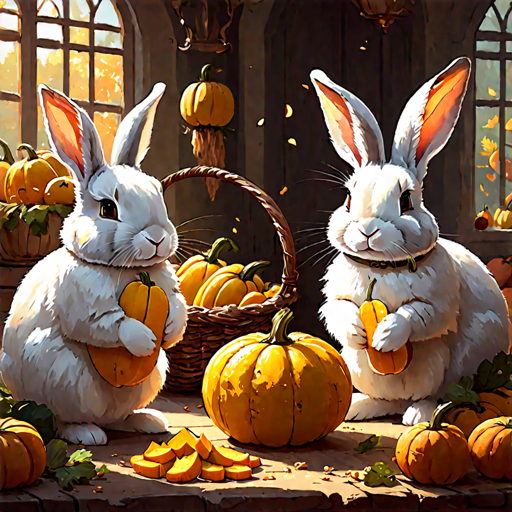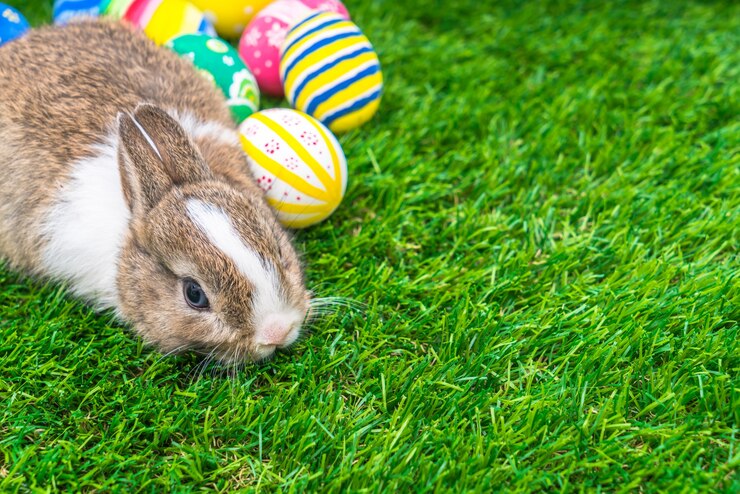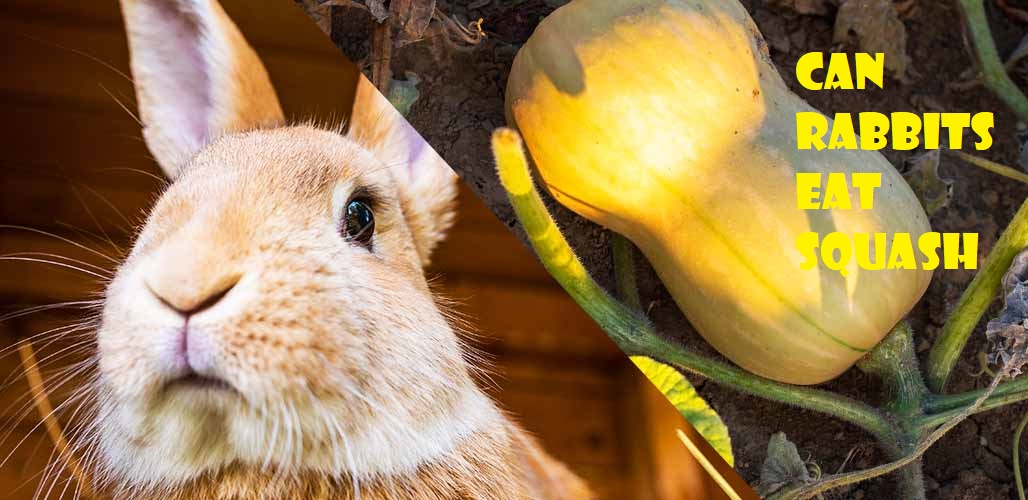You may be wondering, “Can rabbits eat squash?” The answer is yes! Not only can rabbits eat squash, but it also provides numerous benefits and nutritional value for their overall health and well-being.
In this blog post, we will delve into the world of squash and its benefits for rabbits, including its nutritional facts and how to incorporate it into their diet properly.
So, let’s hop right into it and learn more about why squash should be a staple in your rabbit’s diet!
Can Rabbits Eat Squash?
Indeed, rabbits can eat squash! It is a healthy and nutritious food choice that can be included in their diet. But remember, like with any treat, it should be given in moderation.
Excess squash consumption can lead to digestive issues because of its high sugar content. So, while rabbits can relish this vegetable treat, it’s crucial to keep it balanced with other elements of their diet, like hay, pellets, and water.
Feeding squash to your bunny can be a fun and tasty way to add some variety to their mealtime. So, next time you’re preparing a squash dish, don’t hesitate to share a small piece with your rabbit. They’ll appreciate the new taste sensation, and you’ll feel good knowing you’re giving them a nutritious treat.
Remember, “Can Rabbits Eat Squash?” Yes, but always in moderation!

Nutritional Benefits of Squash for Rabbits
Squash is packed with a host of nutrients that can boost your rabbit’s health. Here are seven nutritional benefits your rabbit can gain from consuming squash:
- Rich in Vitamins: Squash is rich in vitamins A, C, and E, all of which are essential for a rabbit’s overall health. Vitamin A is known to support eye health, while vitamin C boosts the immune system, and vitamin E is a powerful antioxidant.
- Packed with Fiber: Rabbits need a diet high in fiber to keep their digestive system running smoothly, and squash delivers just that.
- Low in Fat: Squash is low in fat, making it an excellent treat for maintaining a healthy weight in rabbits.
- Hydrating: Due to its high water content, squash can help keep your rabbit hydrated, especially during the hotter months.
- Rich in Minerals: Squash contains a good amount of essential minerals, including potassium, magnesium, and calcium, which are vital for a rabbit’s bone health and overall well-being.
- Antioxidant Properties: The antioxidant properties in squash help fight off harmful free radicals, promoting overall health in rabbits.
- Source of Beta-carotene: Squash, especially the orange varieties, is a good source of beta-carotene. This compound is converted into vitamin A in the body, which is crucial for maintaining healthy skin and eyes in rabbits.
By incorporating squash into your rabbit’s diet, you’re providing them with a nutrient-rich food that supports their overall health. But remember, moderation is key!
How Often Rabbits Can Eat Squash
When it comes to feeding squash to your rabbit, it’s important to remember that while it’s a nutritious treat, it should not replace their primary diet of hay. Ideally, squash should be given to your rabbit once or twice a week as a treat. A piece of squash about the size of your rabbit’s head is a good serving size.
Too much squash can lead to digestive problems due to its high sugar content. Remember, it’s always a good idea to introduce any new food into your rabbit’s diet gradually. Start by giving them a small piece of squash and see how they react. If they tolerate it well and seem to enjoy it, you can gradually increase the amount, but remember always to keep it balanced.
Different rabbits have different tolerances and preferences, so it’s important to monitor your rabbits closely and adjust their diet accordingly. Feeding your rabbit squash can add a delightful variety to their diet and enrich their health.
Types of Squash That Are Safe for Rabbits
When it comes to squash, there’s a variety available in markets, and luckily, rabbits can enjoy many of them! Here’s a list of safe squash varieties for your furry friend:
- Butternut Squash: This variety is a favorite among rabbits due to its sweet taste. Butternut squash also boasts a high content of vitamin A and fiber.
- Pumpkin: Although technically a squash, pumpkins are a safe and healthy option for rabbits. They’re a rich source of beta-carotene, which benefits your bunny’s eyes and skin.
- Acorn Squash: Acorn squash is another nutritious option for rabbits. It’s packed with vitamins and minerals, and its hard shell can even serve as a chew toy for your bunny.
- Spaghetti Squash: As the name suggests, the inside of this squash resembles spaghetti strands when cooked. It’s not only fun for your rabbit to eat, but it’s also rich in fiber and vitamin C.
- Zucchini: Technically, a summer squash, zucchini, is safe for rabbits. It’s a hydrating food choice due to its high water content.
- Yellow Squash: This is another type of summer squash similar to zucchini. Yellow squash is safe and beneficial for rabbits, offering a good dose of vitamins and minerals. Always remember to remove any seeds and thoroughly wash the squash before serving it to your rabbit.
This will ensure it’s free from any pesticides or harmful bacteria. And as always, moderation is key. Too much squash could lead to digestive issues, so balance it out with hay, water, and other nutritious foods. Happy feeding!

Preparing Squash for Your Rabbit
Preparing squash for your rabbit is simple. First, choose a fresh, ripe squash. Make sure it’s firm and free from any mold or rot.
- Once you have your squash, rinse it thoroughly under running water to remove any dirt, debris, or potential pesticides.
- Next, cut a small piece of squash for your rabbit. Always remember to remove the seeds, as they can be a choking hazard. Some rabbits may enjoy the squash raw, while others might prefer it slightly cooked.
- If you choose to cook it, ensure it’s cooled down completely before serving it to your rabbit.
- Avoid adding any seasoning or spices, as they can upset your rabbit’s stomach. Finally, introduce the squash slowly into your rabbit’s diet.
- Start with a small piece and gradually increase the portion size over time. This will allow you to monitor their reaction and ensure they don’t experience any digestive discomfort.
Always remember, while squash is beneficial, it should only make up a small portion of your rabbit’s diet. Happy meal prepping for your furry friend!
Risk Of Feeding Squash For Rabbits
While squash offers numerous benefits for your bunny, it also carries potential risks if not administered properly.
- One primary concern is its high sugar content. Feeding your rabbit too much squash can lead to a spike in their blood sugar levels, potentially resulting in obesity and other serious health issues. One of them is gastrointestinal stasis, a condition that can be fatal for rabbits.
- Additionally, some rabbits may not tolerate squash well. Introducing squash suddenly into their diet might cause digestive upset, resulting in loose stool or diarrhea. This is why it’s crucial to start with small amounts and observe your bunny’s reaction. Also, remember to remove all seeds from the squash, as these can pose a choking hazard.
Moreover, the skin of the squash, especially if unwashed, could contain traces of harmful pesticides or bacteria, posing another risk. Finally, squash should never replace hay, which needs to make up the bulk of your rabbit’s diet. So, while squash can be a nutritious addition to your bunny’s diet, it’s essential to maintain a balance and feed squash responsibly.
How many squashes can I give my rabbit?
When it comes to feeding your rabbit squash, portion control is essential. As a general guideline, you should feed your rabbit a piece of squash about the size of their head once or twice a week. This size is just right for providing nutritional benefits without overloading your bunny with sugar.
Remember, while squash is a healthy treat, it’s not a main meal. It should supplement their diet of hay, pellets, and water, not replace it. If your bunny seems to really love squash, you might be tempted to give them more, but overindulgence could lead to digestive issues. y
So, for the sake of your furry friend’s health, stick to the recommended serving size and frequency. Always remember, the key to a healthy rabbit diet is balance and variety!
Can Rabbits Eat Yellow or Green Squash?
Absolutely! Rabbits can certainly enjoy both yellow and green squash. Both of these varieties are packed with beneficial nutrients that contribute to a rabbit’s overall health.
Yellow squash, similar to zucchini, is a type of summer squash that offers vitamins and minerals. Green squash, commonly known as zucchini, is hydrating due to its high water content and is a great source of fiber.
Like other types of squash, both yellow and green squash should be thoroughly washed to remove any potential pesticides or bacteria, and the seeds should be removed before serving to your rabbit.
Introduce them gradually into your rabbit’s diet, and remember to balance it with their primary diet of hay, pellets, and water.
So, next time you’re in the produce aisle, feel free to pick up a yellow or green squash for your furry friend. They’re sure to appreciate the tasty and nutritious addition!
Can Bunnies Eat Squash Seeds?
No, it’s best not to give your bunny squash seeds. While these seeds are not toxic, they are hard and can be a potential choking hazard for your furry friend.
The seeds also have a tough outer shell that could cause digestive issues if ingested. Additionally, seeds are not as nutritionally beneficial as the flesh of the squash. So when you’re preparing squash for your bunny, always remove the seeds and save the juicy, nutrient-rich flesh for your pet.
However, don’t let the squash seeds go to waste. They can be roasted and enjoyed as a tasty and healthy snack for humans. Just remember, they’re not suitable for your rabbit. So, when it comes to feeding your bunny squash, keep it seed-free for a safe and enjoyable treat!
Can rabbits eat squash rind?
Absolutely, rabbits can safely eat squash rind! In fact, the rind of squash is rich in fiber, which is beneficial for a rabbit’s digestive health. However, like the rest of the squash, it should be offered in moderation as it also contains sugar.
Before offering your rabbit the squash rind, ensure it is thoroughly washed to remove any potential pesticides or bacteria. Also, it’s best to serve the rind raw, as cooking can make it soft and mushy, potentially leading to a choking hazard. Remember, while the rind is safe, it should not make up a large portion of your rabbit’s diet.
So, next time you’re chopping up a squash, don’t toss the rind! Instead, offer a small piece to your furry friend as a nutritious and delicious treat.
FAQs
Can my rabbit eat all types of squash?
Yes, rabbits can eat various types of squash, including butternut, pumpkin, acorn, spaghetti, zucchini, and yellow squash. However, always remove the seeds and wash the squash thoroughly before serving.
Can rabbits eat cooked squash?
While rabbits can eat cooked squash, it’s important not to add any seasoning or spices. However, many rabbits prefer raw squash, and it retains more of its nutritional value.
Is squash a good source of hydration for rabbits?
Yes, due to its high water content, squash can help keep your rabbit hydrated, especially during warmer months.
Can rabbits eat squash seeds?
No, squash seeds should be removed, as they can be a choking hazard for your rabbit.
How often can I feed my rabbit squash?
You can give your rabbit a piece of squash about the size of their head once or twice a week. Always remember to balance it with their main diet of hay, pellets, and water.
Can too much squash be harmful to rabbits?
Yes, due to squash’s high sugar content, excessive consumption can lead to obesity and digestive problems in rabbits.
Conclusion
Feeding squash to your rabbit can be an exciting and nutritious addition to their diet. With an array of vitamins, fiber, and beneficial antioxidants, squash can indeed support your bunny’s overall health and wellness.
Remember, moderation is key. While rabbits can enjoy this tasty treat, it’s essential to limit their intake due to squash’s high sugar content. Always maintain a balanced diet of hay, pellets, water, and occasional treats like squash.
By slowly introducing it and observing your rabbit’s response, you can ensure it’s a safe and welcomed addition to their mealtime. With the right portion and preparation, your bunny can savor the taste of squash without any risk. Keep in mind that every rabbit is unique and may have different dietary preferences and tolerances.
As rabbit owners, it’s our responsibility to understand these nuances and provide the best care for our furry friends. Happy feeding!

